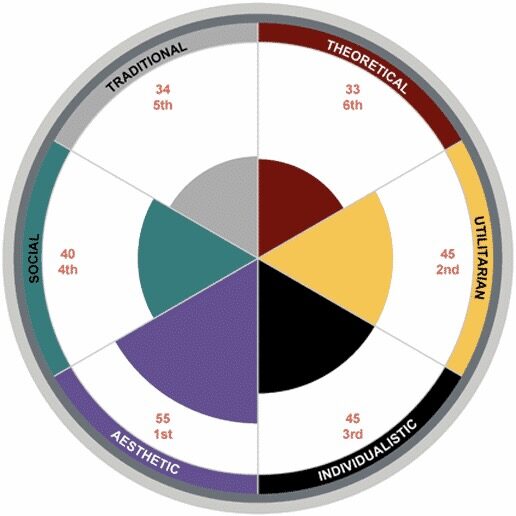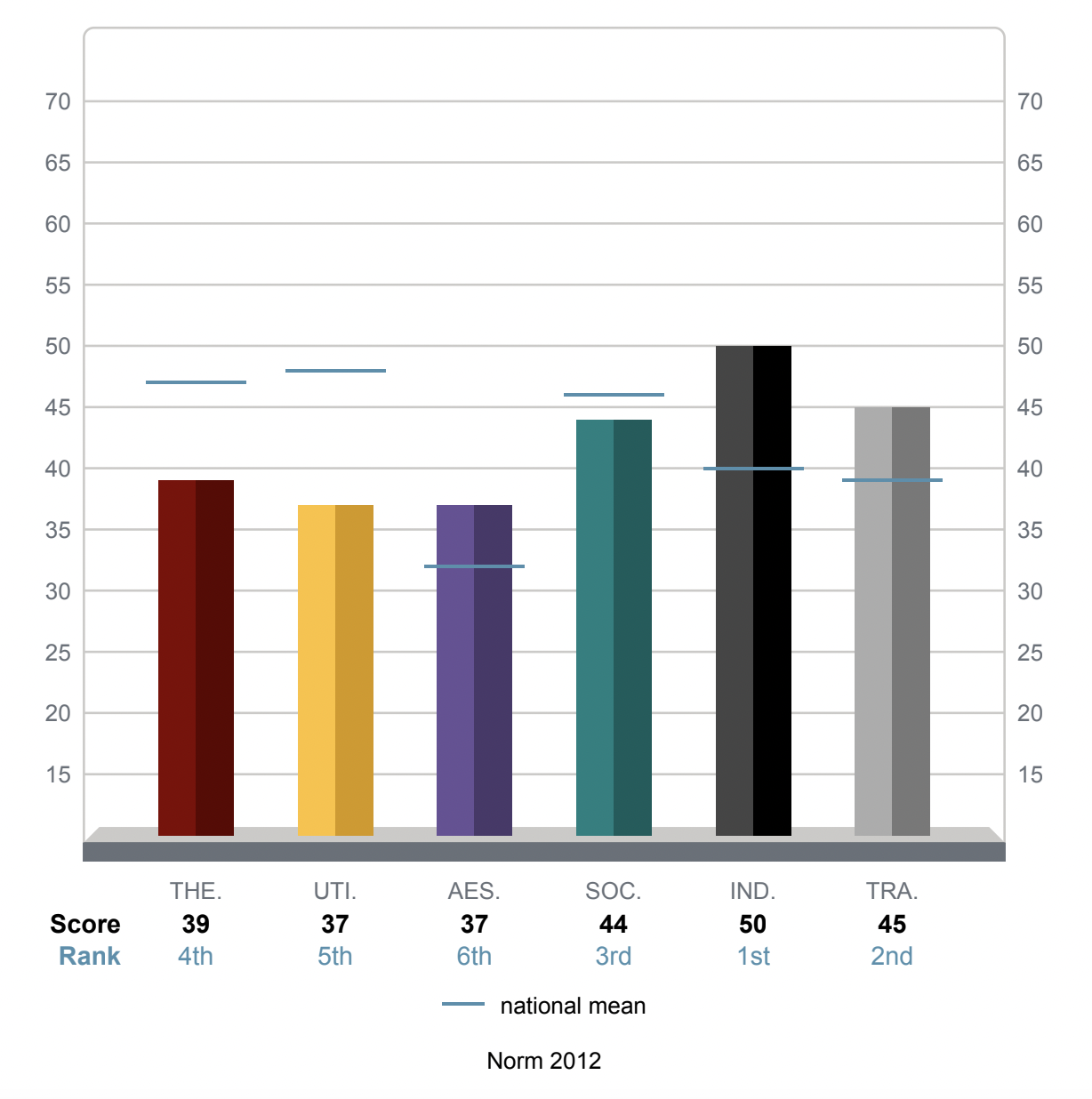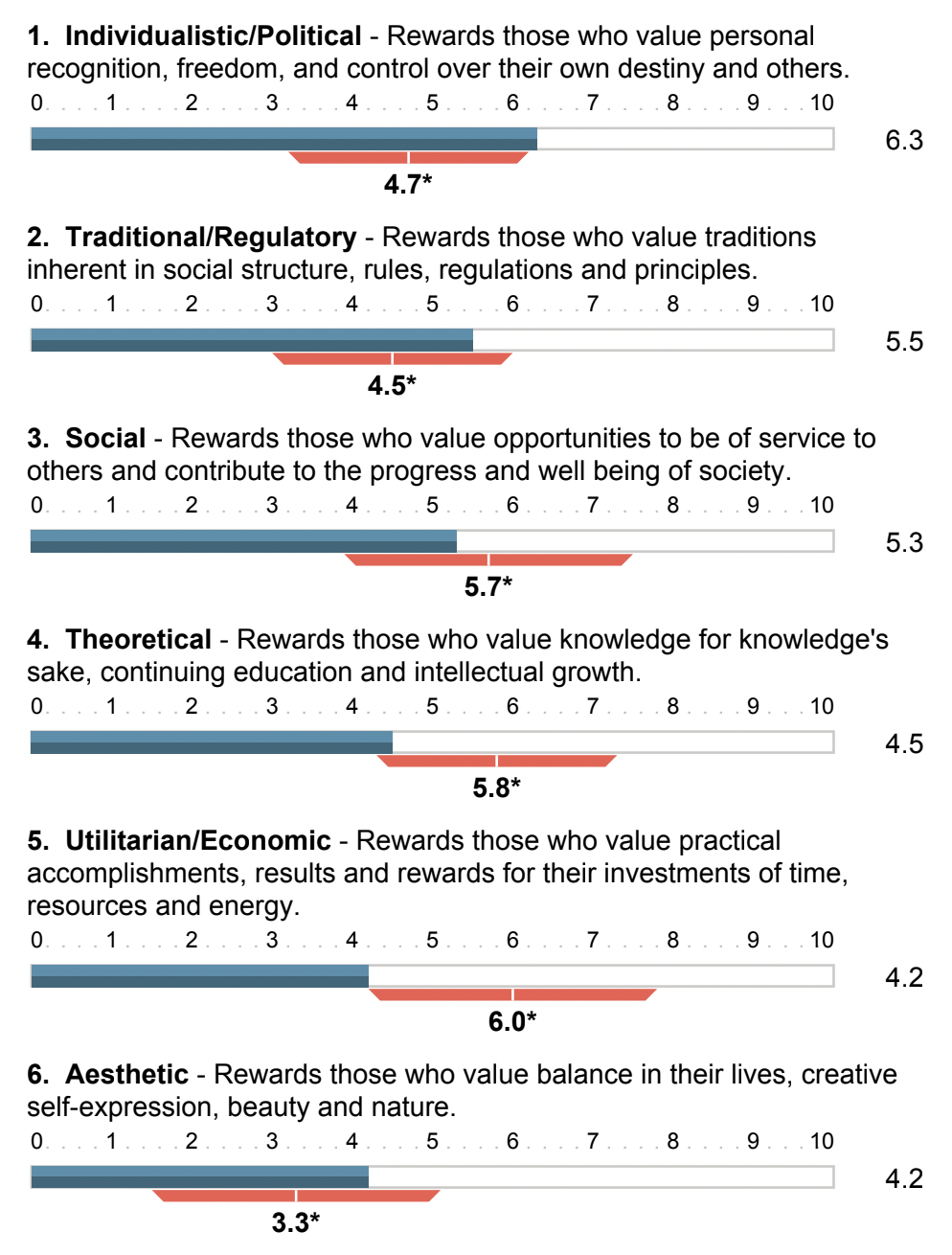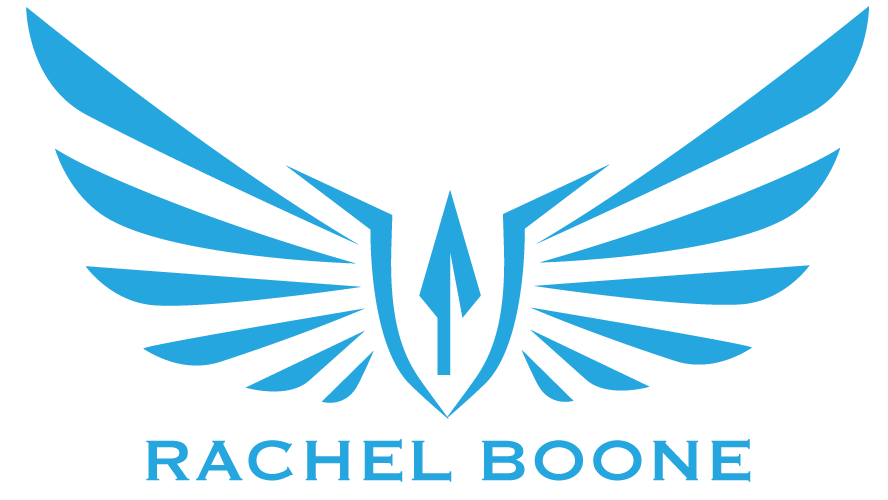If you would like like to get this assessment for yourself


***NOTE: This assessment was taken in 2018
INTRODUCTION
Knowledge of an individual's motivators help to tell us WHY they do things. A review of an individual's experiences, references, education and training help to tell us WHAT they can do. Behavioral assessments help to tell us HOW a person behaves and performs in the work environment. The Personal Motivators & Engagement report measures the relative prominence of six basic interests or motivators (a way of valuing life): Theoretical, Utilitarian, Aesthetic, Social, Individualistic and Traditional.
Motivators help to initiate one's behavior and are sometimes called the hidden motivators because they are not always readily observed. It is the purpose of this report to help illuminate and amplify some of those motivating factors and to build on the strengths that each person brings to the work environment. Based on your choices, this report ranks your relative passion for each of the six motivators. Your top two and sometimes three motivators cause you to move into action. You will feel positive when talking, listening or doing activities that satisfy your top motivators. The feedback you will receive in this section will reflect one of three intensity levels for each of the six motivators.
- Strong - positive feelings that you need to satisfy either on or off the job.
- Situational - where your feelings will range from positive to indifferent based on other priorities in your life at the time. These motivators tend to become more important as your top motivators are satisfied.
- Indifferent - your feelings will be indifferent when related to your 5th or 6th motivator.

INDIVIDUALISTIC
The primary interest for this motivator is POWER, not necessarily politics. Research studies indicate that leaders in most fields have a high power drive. Since competition and struggle play a large part in all areas of life, many philosophers have seen power as the most universal and most fundamental of motives. There are, however, certain personalities in whom the desire for direct expression of this motive is uppermost; who wish, above all, for personal power, influence and renown.
- Rachel has the desire to assert herself and to be recognized for her accomplishments.
- Rachel takes responsibility for her actions.
- If necessary, Rachel will be assertive in meeting her own needs.
- Maintaining individuality is strived for in relationships.
- She wants to control her own destiny and display her independence.
- People who are determined and competitive are liked by Rachel.
TRADITIONAL
The highest interest for this motivator may be called "unity," "order," or "tradition." Individuals with high scores for this motivator seek a system for living. This system can be found in such things as conservatism or any authority that has defined rules, regulations and principles for living.
- She will evaluate others based on her rules for living.
- Rachel likes unity and order in her life.
- She believes strongly in her opinions.
- Rachel lets her conscience be her guide.
- She is true to her personal vision.
- Following proven procedures is more important than quick fixes.
SOCIAL
Those who score very high for this motivator have an inherent love of people. The social person prizes other people and is, therefore, kind, sympathetic and unselfish.
They are likely to find the Theoretical, Utilitarian and Aesthetic attitudes cold and inhuman. Compared to the Individualistic motivator, the Social person regards helping others as the only suitable form for human relationships. Research indicates that in its purest form, the Social interest is selfless.
- Rachel will definitely attempt to help an individual or group overcome a predicament, but only if they have "touched the right chords" within her.
- Rachel's desire to help others (even to her own detriment) or decision not to help others, is reviewed on an individual basis.
THEORETICAL
The primary drive with this motivator is the discovery of TRUTH. In pursuit of this drive, an individual takes a "cognitive" attitude. Such an individual is nonjudgmental regarding the beauty or utility of objects and seeks only to observe and to reason. Since the interests of the theoretical person are empirical, critical and rational, the person appears to be an intellectual. The chief aim in life is to order and systematize knowledge: knowledge for the sake of knowledge.
- In those areas where Rachel has a special interest she will be good at integrating past knowledge to solve current problems.
- If knowledge of a specific subject is not of interest, or is not required for success, Rachel will have a tendency to rely on her intuition or practical information in this area.
- Rachel will seek knowledge based on her needs in individual situations.
- Rachel has the potential to become an expert in her chosen field.
- Rachel will usually have the data to support her convictions.
- If Rachel is truly interested in a specific subject, or if knowledge of specific subject matter is required for success, then she will take the initiative to learn about that subject in great depth.
- A job that challenges the knowledge will increase her job satisfaction.
UTILITARIAN
The Utilitarian score shows a characteristic interest in money and what is useful. This means that an individual wants to have the security that money brings not only for themselves, but for their present and future family. This motivator includes the practical affairs of the business world - the production, marketing and consumption of goods, the use of credit, and the accumulation of tangible wealth. This type of individual is thoroughly practical and conforms well to the stereotype of the average business person. A person with a high score is likely to have a high need to surpass others in wealth.
- There is not a tremendous need for Rachel to have great sums of money.
- Financial security is not a necessity, but a long-term goal.
- Rachel will use her money to satisfy her true motivation.
- Rachel will seek a comfort level in her standard of living and try to maintain that level.
- Money and material possessions are not a high priority for Rachel.
- She is motivated by internal beliefs and does not feel compelled to impress others with material things.
- Overemphasizing the value of money will bore Rachel and turn her off.
- Rachel will not be swayed or motivated by what she feels are excessive material goals.
- Rachel will accept her financial situation and not strive to change it.
- Rachel will not use money as a scorecard to impress others.
AESTHETIC
A higher Aesthetic score indicates a relative interest in "form and harmony." Each experience is judged from the standpoint of grace, symmetry or fitness. Life may be regarded as a procession of events, and each is enjoyed for its own sake. A high score here does not necessarily mean that the incumbent has talents in creative artistry. It indicates a primary interest in the artistic episodes of life.
- Intellectually, Rachel can see the need for beauty, but has difficulty buying the finer things in life.
- She wants to take a practical approach to events.
- Unpleasant surroundings will not stifle her creativity.
- Rachel's passion in life will be found in one or two of the other motivators discussed in this report.
- She is a very practical person who is not sensitive to being in harmony with her surroundings.
- The utility of "something" is more important than its beauty, form and harmony.
- Rachel is not necessarily worried about form and beauty in her environment.
MOTIVATORS HIERARCHY AND GRAPH
Your motivation to succeed in anything you do is determined by your underlying values. You will feel energized and successful at work when your job supports your personal values. They are listed below from the highest to the lowest.


POTENTIAL BEHAVIORAL AND MOTIVATIONAL STRENGTHS
This section describes the potential areas of strengths between Rachel's behavioral style and top two motivators. Identify two to three potential strengths that need to be maximized and rewarded in order to enhance on-the-job satisfaction.
- Forward-looking to improving herself or a situation.
- Bottom-line focused when leading others.
- A leader for those who share her traditions.
- Lives by a specific system and will do anything to protect it.
- Utilizes people to win and accomplish goals.
- Willing to be the spokesperson for the team.
- Always looking to say or do the "right" thing.
- Expresses all that is great about a system of living.
POTENTIAL BEHAVIORAL AND MOTIVATIONAL CONFLICT
This section describes the potential areas of conflict between Rachel's behavioral style and top two motivators. Identify two to three potential conflicts that need to be minimized in order to enhance on-the-job performance.
- Forward-looking to improving herself or a situation.
- Bottom-line focused when leading others.
- A leader for those who share her traditions.
- Unwilling to listen to outside viewpoints.
- As a leader may over focus on self and her own needs.
- May struggle with hearing and applying constructive criticism.
- Will be frustrated when new and exciting opportunities conflict with the system.
- May over look contradictions in her own way of living.
IDEAL ENVIRONMENT
This section identifies the ideal work environment based on Rachel's basic style and top two motivators. People with limited flexibility will find themselves uncomfortable working in any job not described in this section. People with flexibility use intelligence to modify their behavior and can be comfortable in many environments. Use this section to identify specific duties and responsibilities that Rachel enjoys and also those that create frustration.
- Forum to express ideas and viewpoints.
- Tasks involving motivated groups and establishing a network of contacts.
- Nonroutine work with challenge and opportunity.
- Management that appreciates and rewards powerful risk-taking.
- Opportunity to display excitement and fun while getting others to act.
- Ability to be self-starting and forward looking as it relates to challenging the status quo.
- A forum to challenge rules in which she doesn't agree.
- A forum to express the experience of following the system or process.
- Opportunity to make an existing system quicker, better and faster.
KEYS TO MOTIVATING
This section of the report was produced by analyzing Rachel's wants. People are motivated by the things they want; thus wants that are satisfied no longer motivate.
Review each statement produced in this section with Rachel and highlight those that are present "wants."
- Freedom to talk and participate on the team.
- Public recognition of her ideas and results.
- Prestige, position and titles so she can control the destiny of others.
- A manager and a team that understands the value of short-term and fast-moving ideas and results.
- Recognition for leadership accomplishments and the results she receives.
- Power and control over outcomes and goals.
- A manager and a team that understand if her system is challenged, the disagreement may be discussed in an aggressive way.
- To create new ideas for others through the spreading of the organizational message.
- All systems and structures to be efficient and move things toward the desired result.
KEYS TO MANAGING
In this section are some needs which must be met in order for Rachel to perform at an optimum level. Some needs can be met by herself, while management must provide for others. It is difficult for a person to enter a motivational environment when that person's basic management needs have not been fulfilled. Review the list with Rachel and identify 3 or 4 statements that are most important to her. This allows Rachel to participate in forming her own personal management plan.
- To mask emotions when appropriate.
- People to work and associate with.
- To be confronted when in disagreement, or when she breaks the rules.
- Support in properly displaying her passion for the way things should be.
- Help in limiting interruptions because of the desire to be involved in too many projects.
- To listen to others and understand different perspectives in order to meet objectives.
- Help understanding the effect on her image when she disengages from uncontrolled projects.
- To manage time and avoid getting "bogged-down" with fitting the people and the work into the system.
- A manager that understands her potentially explosive nature is out of the desire to achieve and win within the system.
